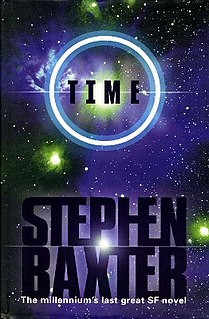 W
WBetween the Strokes of Night (1985) is a science fiction novel by Charles Sheffield. It first appeared in the March to June 1985 issues of Analog Science Fiction/Science Fact before being published by Baen Books in July 1985. The story is divided in two vastly separated time periods: the near future of 2010, and the far future of 29,000 AD. Due to the unique technological mechanisms of the novel, the same cast of characters appears in both parts, though it is not a time travel story.
 W
WCity at the End of Time is a 2008 science fiction novel by American writer Greg Bear. It was published in August 2008 by Del Rey in the United States, and Gollancz in the United Kingdom. The story follows three drifters in present-day Seattle who are tormented by strange dreams of the Kalpa, a city one hundred trillion years in the future. The Kalpa is attempting to ward off the Typhon, an inexplicable entity that has consumed the rest of the ancient universe and broken down the laws of physics.
 W
WThe Dancers at the End of Time is a series of science fiction novels and short stories written by Michael Moorcock, the setting of which is the End of Time, an era "where entropy is king and the universe has begun collapsing upon itself". The inhabitants of this era are immortal decadents, who create flights of fancy via the use of power rings that draw on energy devised and stored by their ancestors millions of years prior. Time travel is possible, and throughout the series various points in time are visited and revisited. Space travellers are also common, but most residents of the End of Time find leaving the planet distasteful and clichéd. The title of the series is itself taken from a poem by a fictitious 19th-century poet, Ernest Wheldrake, which Mrs. Amelia Underwood quotes in The End of All Songs. "Ernest Wheldrake" had been a pseudonym used by Algernon Charles Swinburne.
 W
WDarwinia is a 1998 science fiction/alternate history novel by American-Canadian writer Robert Charles Wilson.
 W
WDiaspora is a hard science fiction novel by the Australian writer Greg Egan which first appeared in print in 1997. It originated as the short story "Wang's Carpets" which originally appeared in the Greg Bear-edited anthology New Legends. The story appears as a chapter of the novel.
 W
WHegira is a 1979 science fiction novel by American writer Greg Bear. It deals with themes including cyclic time, artificial intelligence, artificial life, and artificial structures of planetary scale.
 W
WI, Q is a 2000 Star Trek novel by John de Lancie and Peter David. Set in the Star Trek: The Next Generation fictional universe, the novel depicts Q joining forces with Captain Jean-Luc Picard and Lieutenant Commander Data to save his wife and son and avert the end of the universe. It is the first novel to explore Q's parenthood. De Lancie, who played Q on several Star Trek television series, was the only Next Generation actor to write a novel based on his character.
 W
WThe Restaurant at the End of the Universe is the second book in the Hitchhiker's Guide to the Galaxy comedy science fiction "trilogy" by Douglas Adams, and is a sequel. It was originally published by Pan Books as a paperback. The book was inspired by the song "Grand Hotel" by British rock band Procol Harum. The book title refers to Milliways, the Restaurant at the End of the Universe, one of the settings of the book.
 W
WStar Maker is a science fiction novel by British writer Olaf Stapledon, published in 1937. The book describes a history of life in the universe, dwarfing in scale Stapledon's previous book, Last and First Men (1930), a history of the human species over two billion years. Star Maker tackles philosophical themes such as the essence of life, of birth, decay and death, and the relationship between creation and creator. A pervading theme is that of progressive unity within and between different civilizations. Some of the elements and themes briefly discussed prefigure later fiction concerning genetic engineering and alien life forms. Sir Arthur C. Clarke considered Star Maker to be "probably the most powerful work of imagination ever written", and Brian W. Aldiss called it "the one great grey holy book of science fiction".
 W
WTau Zero is a hard science fiction novel by American writer Poul Anderson. The novel was based upon the short story "To Outlive Eternity" appearing in Galaxy Science Fiction in 1967. It was first published in book form in 1970. The book is a quintessential example of "hard sci-fi", as its plot is dominated by futuristic technology. It was nominated for the Hugo Award for Best Novel in 1971.
 W
WManifold: Time is a 1999 science fiction novel by Stephen Baxter. It is the first of Baxter's Manifold Trilogy, although the books can be read in any order because the series takes place in a multiverse.
 W
WWorld at the End of Time is a 1990 hard science fiction novel by American writer Frederik Pohl. It tells the parallel stories of a human and a plasma-based intelligence who manage to survive to the time near the heat death of the universe. The book is thus a combined work in speculative cosmology and space colonization.